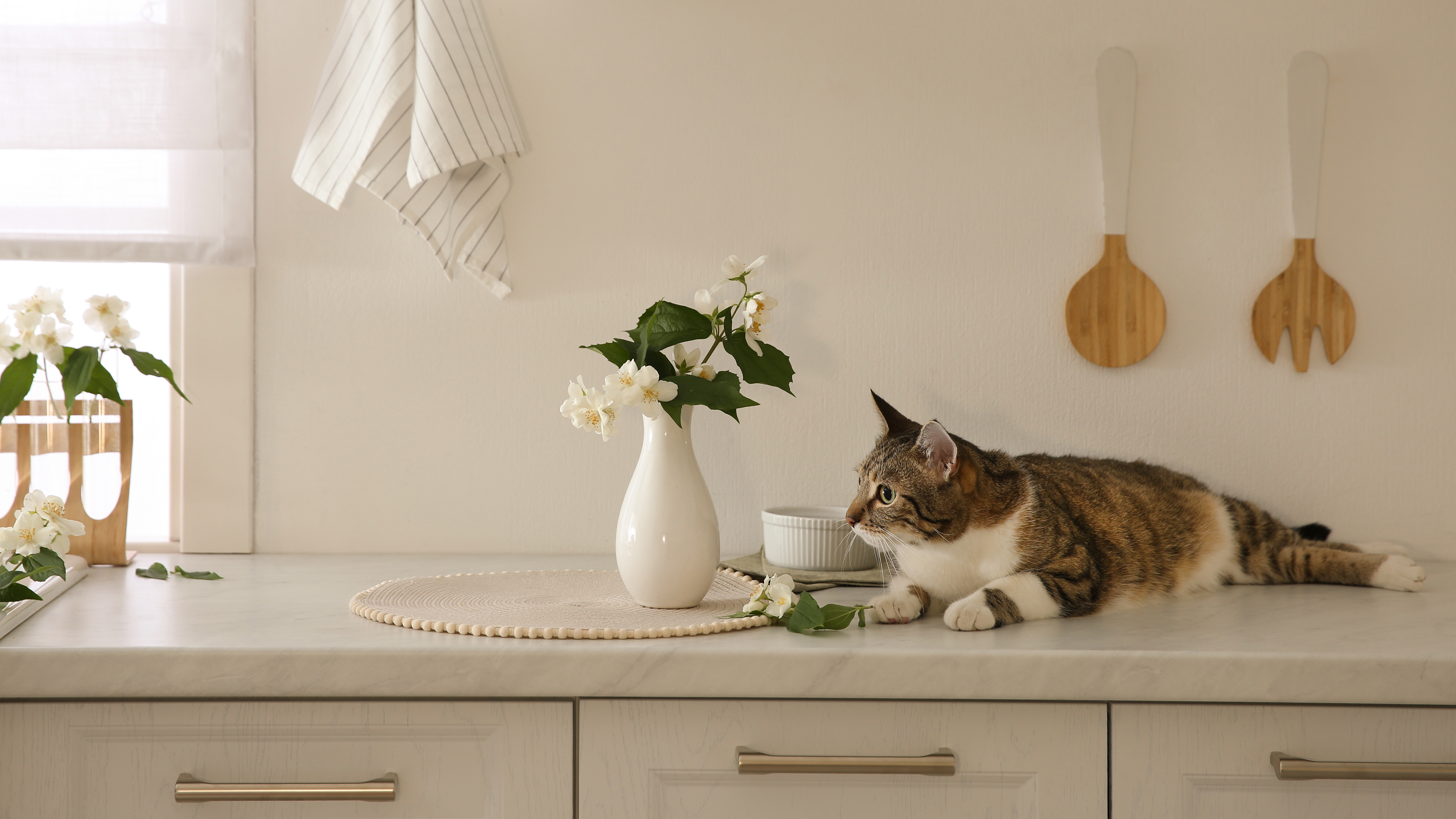
If you are Googling 'how to keep cats off counters', we hear you. Having to wipe visible muddy paw prints, or invisible bacteria that you know is there, from your pristine kitchen surfaces regularly is annoying, no matter how much you love your fluffy friend. The trouble with cats is that, unlike dogs, they don't seem to heed human commands and will do mostly as they please. Unless you make the undesirable behavior that little bit more difficult for them...
So, while researching the best ways to clean up after cats will go some way in keeping your kitchen clean, preventing your cat from constantly jumping up on the counters in the first place, is a better long-term strategy.
How to keep cats off counters
Remember to be realistic and to treat these tricks as trial and error, because no method is 100 percent effective. If your cat really likes sprawling on your kitchen counter, they'll probably still do it every now and then. The goal is to reduce the frequency of them doing it.
1. Use double-sided sticky tape
You will need:
All you need to do is secure the double-sided sticky tape along the edges of your kitchen counters. Make sure you cover the whole perimeter and leave no gaps. Cats hate the stuff and likely will leave your counter alone. Camille Dubuis-Welch, Deputy Editor of Real Homes and cat owner swears by 'Petslucent Cat Scratch Deterrent Sticky Paws Tape' to protect different surfaces from her cat's paws and/or claws around the home. 'It's so easy to apply and it just makes surfaces less desirable for them to go at, without hurting their paws or ruining your countertops or carpets furthermore.'
Note that this method should hopefully be temporary and the sticky tape will stop being so sticky after a while. 'Plus, it's cheap and by the time the stickiness wears off, your cat will most likely have lost interest in that particular spot anyway!'
Patch-testing for a few days should give you an idea of whether this method will work for you. If this isn't enough to put your cat off, you could reapply and try again or combine this with another of the methods below. Be sure to choose a brand that won't do damage to your counters and we'd recommend testing a small piece on an inconspicuous spot before taping the whole area as some countertop materials may be more susceptible to damage.
Bonus tips: This method is also very effective for stopping your cat from scratching your sofa or armchair.

2. Try kitchen foil or baking sheets
You will need:
- Any type ofkitchen foil
For whatever reason known to cats only, they dislike the crinkly texture and sound foil makes under their paws, so will soon learn to avoid the spot.
The annoying part for you is having foil all over your kitchen counter, but the idea is that you'll only need to keep it there temporarily. Once your cat begins associating your kitchen counters with something unpleasant, they likely will stop jumping up on top of them.
3. Try cucumber as a deterrent
You will need:
- Fresh cucumber
As anyone who has watched cats on YouTube will know, about half of cats seem irrationally terrified of cucumbers. Animal behavior experts are still trying to figure this one out, although it might have something to do with cucumbers reminding cats of snakes. Cats also hate the smell of fresh cucumber, so leaving cucumber slices along the counter may help to deter them.
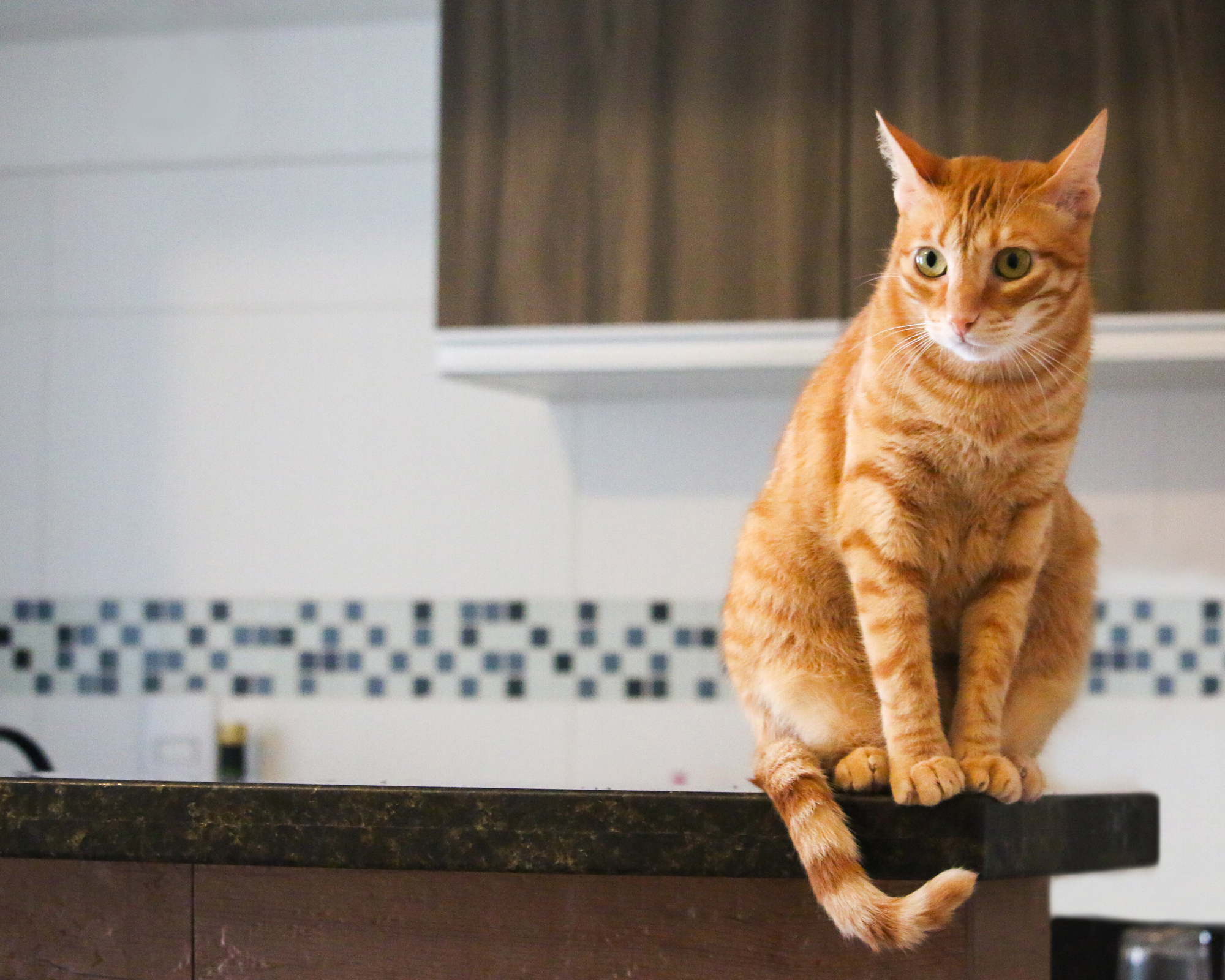
4. Give them plenty of exercise away from the counter
You will need:
- A cat tree
Cats are naturally curious and like exploring, as well as finding yet new spots to relax and survey their territory. Cat trees provide your cats with exactly the right combination of opportunities for jumping and climbing and resting spots, so it's well worth investing in one. Bored and understimulated cats are more likely to act out to get attention, so incorporating plenty of playtime with them into your daily routine will also help.
Doron Wolffberg, Founder of All About Cats, comments: 'If your cat loves to explore and counters are often one of their preferred areas to roam about on, then it’s worth investing or building a climbing tree or tower to keep them occupied. The different textures and levels of a cat tower will be more inviting than your kitchen worktop or other similar areas.'
5. Be consistent with saying no
You will need:
- Plenty of patience
Contrary to what you may have read online, cats do respond to negative enforcement. They are very attuned to their humans' tone of voice and body language and know when they are being told off. So, saying 'no' firmly whenever they jump up on your counter does work, but only if you do it consistently. They say that all it takes is forgetting to say 'no' one time out of ten for the cat to decide that the unwanted behavior is, in fact, acceptable. Firm and consistent discouragement of behavior does not amount to punishment and your cat will learn, but you will need to give it a good few weeks to see results.
6. Get your cat a drinking fountain
You will need:
- A cat drinking fountain or water bowl
If your cat is jumping up on your kitchen counter and drinks water from your kitchen faucet, it's highly likely that your cat is actually thirsty. Some cats don't have a very strong drive to drink water so may ignore a bowl of standing water, but all cats can get dehydrated, so it's important to provide them with fresh water at all times. If your cat is constantly licking water from your faucet this isn't just a cute quirk – it's worth getting them a cat fountain to see if they'll switch to it.
7. Remove chairs from around your counters
This may not be the best news for your breakfast bar ideas, but if you have chairs next to your counters, it's much easier for your cat to jump up, making it more enticing. Wolffberg explains that 'many cats often find themselves on counters thanks to the help of chairs and other items of furniture close by, which give them a starting point to make the jump less complicated. If this is the case for your cat, then simply remove any chairs or similar objects that can help your cat reach higher surfaces.'
How to keep cats off counters: what not to do
Although trying a few different methods is a good idea, there are things that definitely won't work to deter your cat from your kitchen counters, and may even permanently affect your relationship with your cat. These include:
- Harsh punishment or shouting: Cats do not understand punishment; all they'll learn from it is to fear and avoid you. This also goes for excessively raising your voice.
- Strong-smelling chemicals or cleaners: this may be tempting as cats dislike strong smells, but if your cat does jump up and ends up with harsh chemicals on its paws and then licks them, you'll end up with a sick cat.
- Spraying your cat with water: this is cruel and again will only teach your cat to be afraid of you without understanding what they've done wrong.
- Essential oils: most essential oils are highly toxic to cats and shouldn't be used around them in any form.
Join our newsletter
Get small space home decor ideas, celeb inspiration, DIY tips and more, straight to your inbox!
Anna is a professional writer with many years of experience. She has a passion for contemporary home decor and gardening. She covers a range of topics, from practical advice to interior and garden design.
-
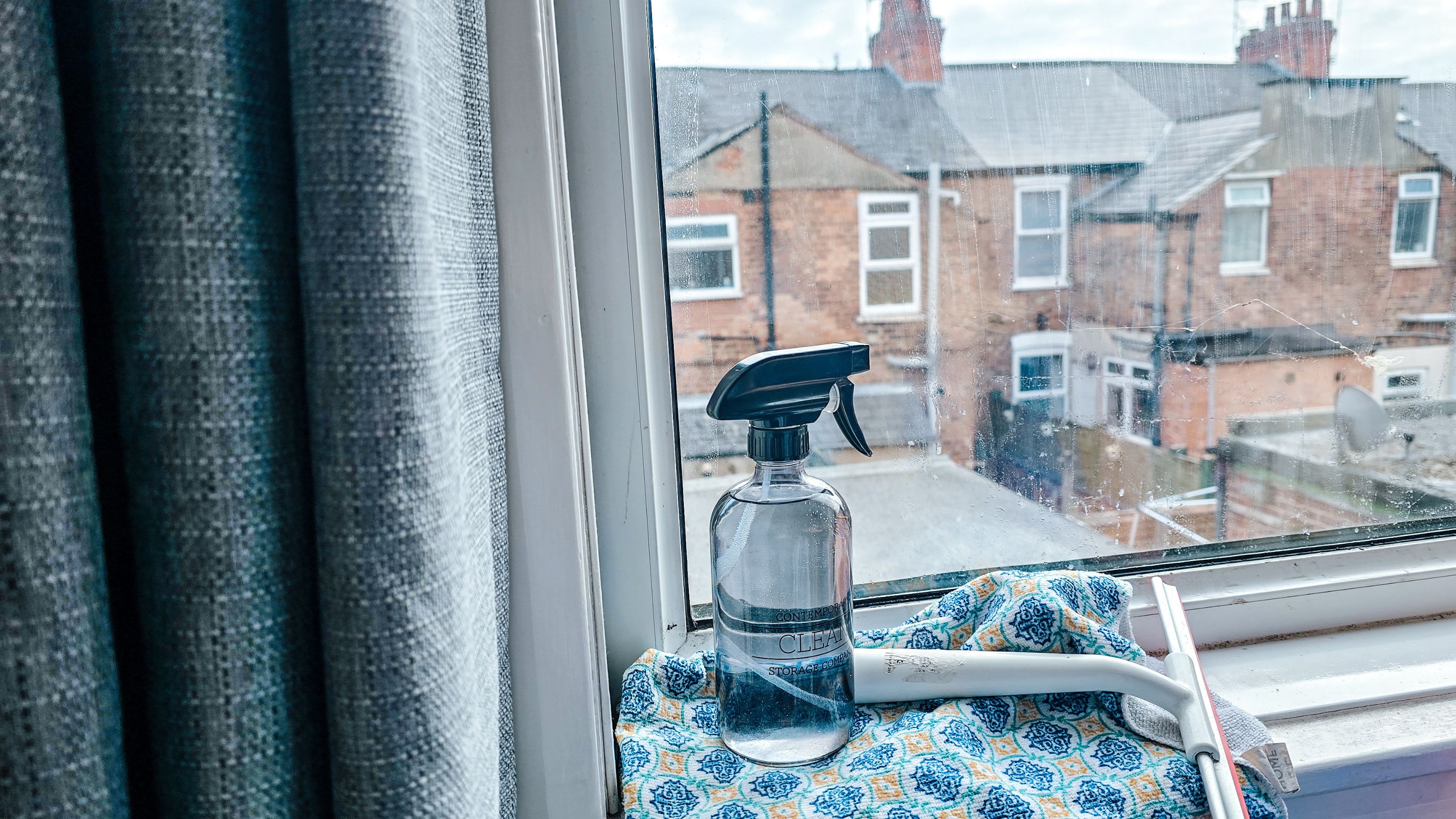 How to clean windows without streaks — 5 easy steps that cleaning pros always follow
How to clean windows without streaks — 5 easy steps that cleaning pros always followThis method on how to clean windows is favored by professional cleaners. We've asked them for the steps you should follow, plus picked cleaning buys
By Eve Smallman
-
 How to get cat pee smell out of your home — 5 steps to solving feline mishaps
How to get cat pee smell out of your home — 5 steps to solving feline mishapsWondering how to get cat pee smell out of your home? Our expert guide will have your home smelling fresh in no time.
By Andy van Terheyden
-
 The latest Shark sale deals are perfect for pollen-proofing your home — with up to $150 off our favorite vacuums
The latest Shark sale deals are perfect for pollen-proofing your home — with up to $150 off our favorite vacuumsWe found the latest Shark sale deals on vacuums that are sure to be swooped up, especially as spring blooms trigger pollen allergies and we're in need of extra cleaning
By Danielle Valente
-
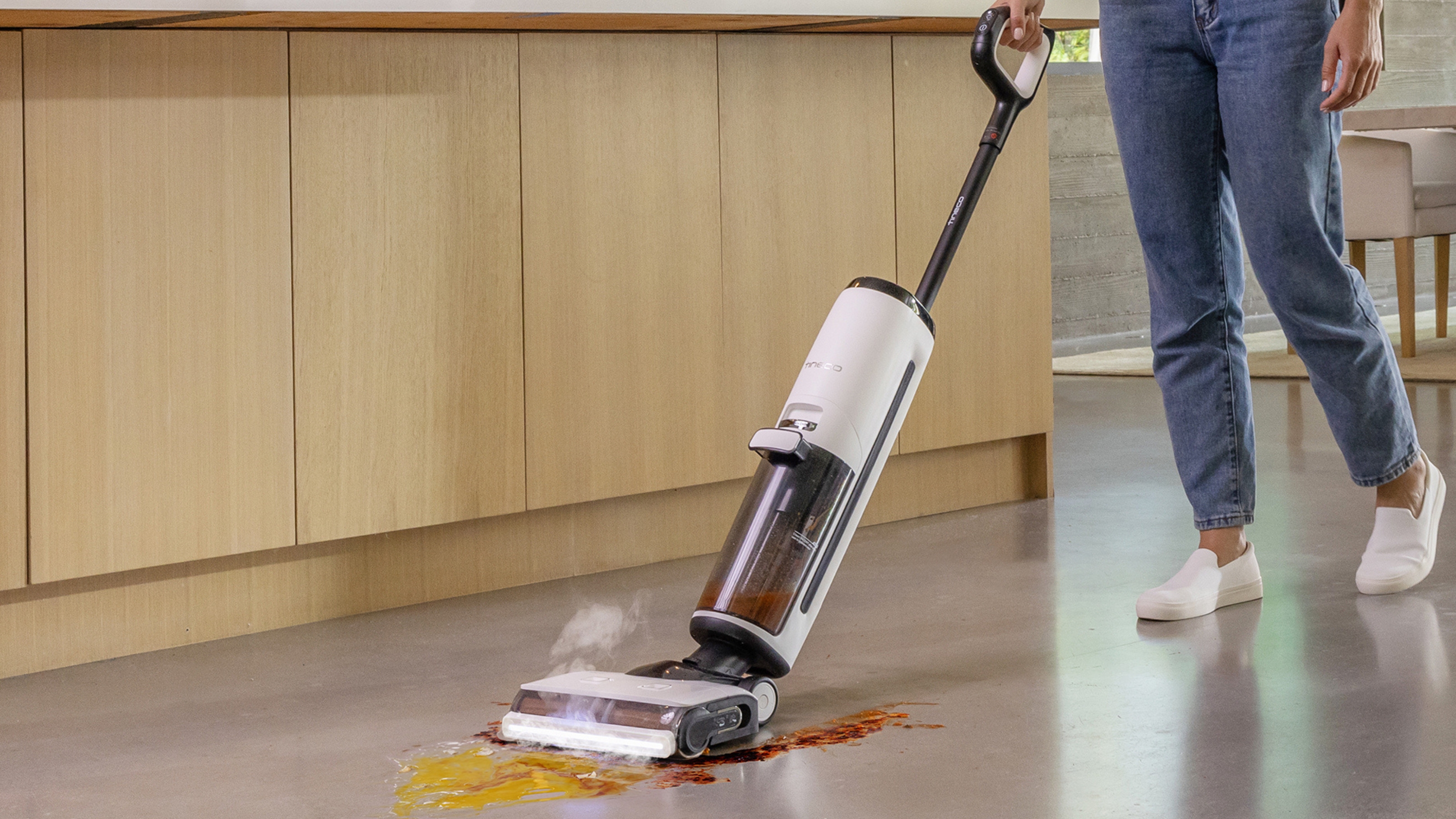
 Tineco Floor One S7 steam wet-dry vacuum review — spotless floors with minimal effort
Tineco Floor One S7 steam wet-dry vacuum review — spotless floors with minimal effortOur contributing editor, Camryn Rabideau, tests the Tineco Floor One S7 steam wet-dry vacuum in her New England homestead property
By Camryn Rabideau
-
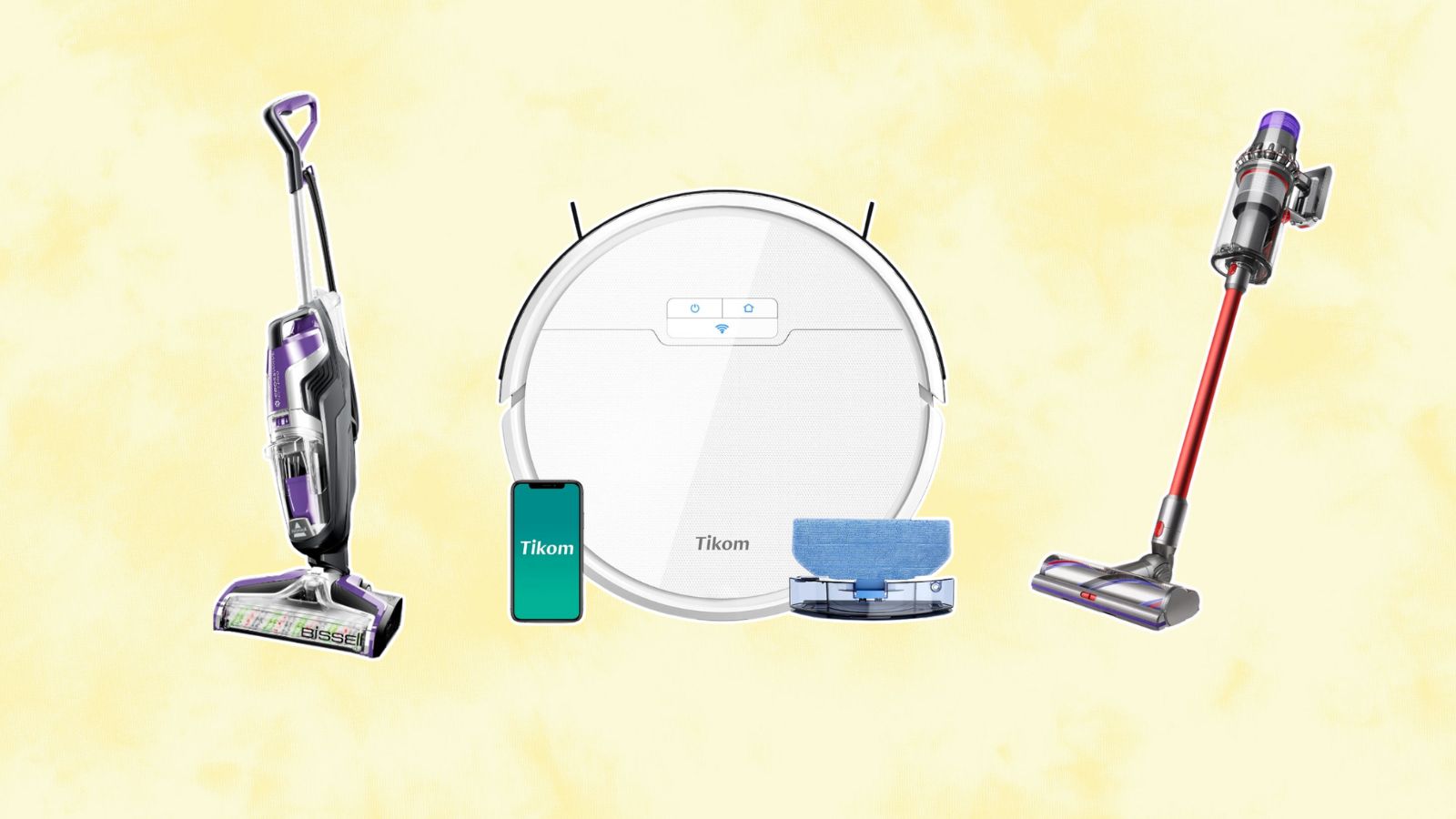 Amazon vacuum cleaners to nab during the retailer's Big Spring Sale — save up to 60% off our go-to small-space finds
Amazon vacuum cleaners to nab during the retailer's Big Spring Sale — save up to 60% off our go-to small-space findsChecking out the savings on Amazon? Vacuum cleaners are a must-buy during their first Big Spring Sale — here are our favorites up to 60% off
By Danielle Valente
-
 The Home Edit Walmart cleaning collection has just debuted with finds from $3
The Home Edit Walmart cleaning collection has just debuted with finds from $3Spring cleaning, anyone? The Home Edit Walmart cleaning collection has hit shelves with picks from $3
By Danielle Valente
-
 How to clean carpet on stairs — 3 simple steps to a spruced up staircase
How to clean carpet on stairs — 3 simple steps to a spruced up staircaseWant to know how to clean carpet on stairs? Our experts explain the simple steps to a sparkling stairway without too much elbow grease
By Andy van Terheyden
-
 The Home Depot backyard and patio cleaning supplies we're stocking up on before spring
The Home Depot backyard and patio cleaning supplies we're stocking up on before springDon't forget the outdoors when spring cleaning — The Home Depot backyard and patio cleaning buys from $11 will assist with tidying up
By Danielle Valente